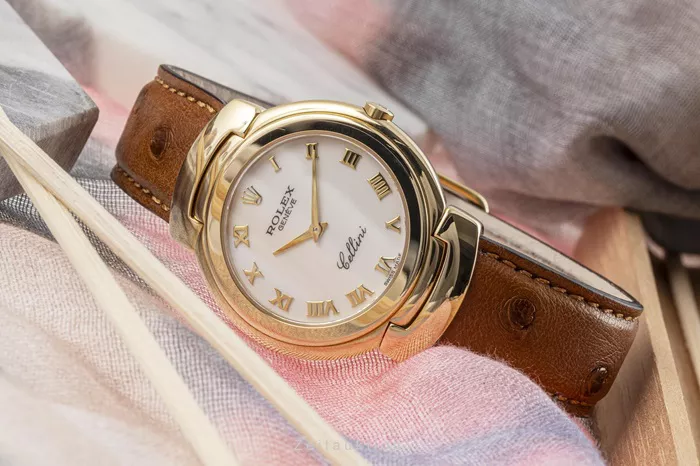Rolex is a name synonymous with luxury, precision, and heritage in horology. While most enthusiasts associate Rolex with its iconic mechanical movements, there exists a more refined and often overlooked chapter in the brand’s history: the Rolex Cellini Quartz. The Cellini line represents Rolex’s artistic and dressier side, and the inclusion of quartz technology in this collection provides a fascinating look into Rolex’s adaptation to modern trends while maintaining traditional elegance.
The Birth of the Cellini Line
Origins of the Rolex Cellini Collection
Named after Benvenuto Cellini, a renowned Italian Renaissance artist and goldsmith, the Rolex Cellini line was launched to reflect the artistry and craftsmanship of its namesake. Unlike Rolex’s professional tool watches, the Cellini collection focuses on elegance, formality, and refined aesthetics.
The 1970s Quartz Revolution
The 1970s brought about the quartz crisis — a time when traditional mechanical watchmakers faced fierce competition from quartz-powered watches, mainly from Japanese brands. Rolex, despite its mechanical mastery, recognized the need to innovate. This era marked the development and eventual release of quartz movements by the brand.
Understanding Quartz Technology
How Quartz Movements Work
Quartz movements operate through a battery-powered oscillator regulated by a piece of quartz crystal. When an electric current is applied, the quartz vibrates at a precise frequency, allowing the movement to keep extremely accurate time.
Rolex and Quartz Innovation
Rolex did not simply adopt quartz technology — they improved upon it. The brand collaborated with other Swiss watchmakers to form the Centre Electronique Horloger (CEH) and eventually developed its own in-house quartz calibers, notably the 5035 and 5055 movements.
Rolex Cellini Quartz: A Detailed Look
Introduction of the Cellini Quartz Models
The Rolex Cellini Quartz was introduced in the late 1970s and continued production into the early 2000s. These watches embodied the timeless elegance of the Cellini line, paired with the precision and convenience of quartz technology.
Design and Aesthetics
The Cellini Quartz models are known for their sleek, minimalist designs. They often feature:
- Slim profiles
- Elegant round or cushion-shaped cases
- Precious metals like 18k gold
- Minimalist dials with simple hour markers
- Leather straps or integrated bracelets
These watches were crafted to complement formal attire and appeal to those seeking classic style.
The Rolex Caliber 6620 and 6621
Rolex developed several in-house quartz calibers for the Cellini line. The most notable among them are the 6620 and 6621. These movements are characterized by their:
- High accuracy
- Robust construction
- Hand-finished details
- Longevity and reliability
Unlike Rolex’s Oysterquartz models, the Cellini Quartz calibers were made specifically for dress watches, emphasizing refinement over sportiness.
Differences from the Oysterquartz
While both the Cellini Quartz and Oysterquartz lines utilize quartz movements, they are fundamentally different in purpose and design. The Oysterquartz was made for sportier models like the Datejust and Day-Date and featured angular, integrated cases. The Cellini Quartz, on the other hand, was designed for sophistication, featuring:
- Traditional rounded cases
- No date functions
- Non-Oyster cases (not water-resistant)
- Manual-like aesthetics
Collectibility and Market Value
Rarity and Production Numbers
Rolex never produced Cellini Quartz models in large quantities. Their limited production, combined with their understated appearance, makes them rare finds today. Collectors appreciate them for their exclusivity and the insight they offer into Rolex’s adaptation during the quartz era.
Investment Potential
Though not as popular as their mechanical counterparts, Cellini Quartz models have seen a gradual rise in value. This is due to:
- Their rarity
- The quality of craftsmanship
- Rolex branding
- Growing appreciation for vintage quartz watches
Notable References
Some notable references in the Cellini Quartz lineup include:
- Reference 6621: Often in yellow gold with white or champagne dial
- Reference 6623: Features a slightly larger case size
- Reference 6622: More variation in case materials and dial designs
Each reference maintains the refined DNA of the Cellini collection while showcasing Rolex’s interpretation of quartz technology.
Ownership Experience
Maintenance and Servicing
One of the advantages of owning a Cellini Quartz is reduced maintenance compared to mechanical watches. Battery replacements and occasional servicing are generally all that’s required. However, due to the age of these models, it is crucial to:
- Source original parts
- Work with Rolex-certified watchmakers
- Ensure movements are properly calibrated
Wearing the Cellini Quartz
These watches are designed for elegance and comfort. Their slim profiles fit well under dress cuffs, and the precious metal cases add a touch of luxury. Ideal for formal settings, the Cellini Quartz also makes a subtle statement of sophistication.
The Legacy of the Rolex Cellini Quartz
An Underrated Chapter in Rolex History
While often overshadowed by mechanical icons like the Submariner or the Day-Date, the Cellini Quartz deserves recognition. It represents Rolex’s commitment to innovation, even in a time of industry upheaval. These watches combine the brand’s legacy with a forward-looking vision.
Modern-Day Relevance
Although Rolex no longer produces quartz watches, the Cellini Quartz remains relevant for collectors and enthusiasts who appreciate:
- Historical context
- Technical achievements
- Timeless design
These timepieces bridge the gap between heritage and modernity.
Conclusion
The Rolex Cellini Quartz is a unique blend of tradition and innovation. With its refined aesthetics, in-house quartz movements, and limited production, it stands as a testament to Rolex’s ability to adapt without compromising quality. For collectors, historians, and those who appreciate understated luxury, the Cellini Quartz is a worthy addition to any watch collection. In the broader context of Rolex’s legacy, it remains an elegant and intelligent response to a transformative era in horology.


